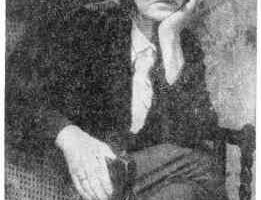Katharine Susannah Prichard 1883-1969
Katharine Susannah Prichard was the first Australian novelist to gain international recognition. In 1915, her novel, The Pioneers, won the Hodder and Stoughton All Empire Literature Prize for Australasia.
Fifty years later, with thirteen novels to her credit, five collections of short stories, ten plays, two films, two volumes of verse, translations into thirteen foreign languages and prizes for a novel, a short story and a play, Katherine confessed that she had been born “with ink in her veins”. A love for writing was her inheritance.
Her father had been Editor of The Fiji Times when she was born at the height of a hurricane. “The Child of the Hurricane” the Fijians called her. It was to be the title of her autobiography, written in 1964 after she had lived through a lifetime of conflict, triumph, tragedy and unremitting struggle for the things she believed in.
The editor’s blue pencil was her first literary lesson as a staff journalist on The Melbourne Herald. “You must make every word count”, he taught her. But when the opportunity arrived in 1908, she eagerly accepted an assignment in London and Paris.
The misery of starving men and women, the homeless, the desperation of the hunger marchers spurred her search for the way to a fairer world. “I wouldn’t have the poor of London on my conscience”, she wrote. She found her answer in the promises of socialism – hopeless dreams, until she saw in the improbable victory of the Bolsheviks in Russia, the hope that their dreams might become reality.
London too brought changes to her own life. With the laurels of her own literary victory still fresh, she met an Australian Light Horseman at a convalescent hospital for Australian soldiers. Lieut. Hugo Throssell from Perth had recently been awarded the Victoria Cross for outstanding gallantry at Gallipoli.
Katharine Prichard had returned to Melbourne to a triumphal welcome when the war ended and Captain Hugo Throssell V.C. could also come home to Australia and claim her. Katharine and her “Jim” were married in 1919, with bushfire smoke blue in the air around their honeymoon cottage at Greenmount.
Her greatest work was done in the first ten joyous years of their life together at their home at Greenmount. She had determined that her work would celebrate Australia and Australian working people. Her novels fulfilled that pledge. In The Black Opal she wrote of the opal miners of Lightning Ridge; Working Bullocks told of the timber workers of the karri forests; Coonardoo spoke with warmth and understanding of the Aborigines on the north west cattle stations, as none had written of the native people before; Haxby’s Circus told the story of a crippled bareback rider with a travelling circus.
With her own career promising a new future, she became a foundation member of the Communist Party of Australia. Her only child, Ric Throssell, was born in 1922.
Those years of creative achievement were destroyed by the agonies of the Great Depression. Unable to find work, obsessed by overwhelming debt and a sense of failure, Hugo Throssell V.C. shot himself while she was overseas.
He left a note appealing to the government to grant a war pension to his widow.
When she could face her private pain, Katharine Prichard returned to her tragic novel of the Depression, Intimate Strangers, which some have wrongly identified with Hugo Throssell’s suicide. After the Second World War, with her political duties in support of the common war effort done, she completed the goldfields trilogy, The Roaring Nineties, Golden Miles and Winged Seeds, as much a social history of the discovery and exploitation of gold in Western Australia, as the story of three generations of men and women of the goldfields.
A stroke that left her unable to move her hand interrupted her last novel, Subtle Flame, dedicated to the peace movement, but she learnt to write again and dictated the last of the novel to the comrade to whom the book was dedicated.
Katharine Susannah Prichard died at her home in Greenmount on 2 October 1969. Her ashes were scattered on the slopes of Greenmount as she wished. “Good to think of becoming part of the earth, and perhaps nourishing a wild flower,” she had written.
Ric Throssell
Child of the Hurricane by Katharine Susannah Prichard (A & R Classics, 1974) Wild Weeds and Wind Flowers: The Life and Letters of Katharine Susannah Prichard by Ric Throssell (Collins: A & R Imprint, 1990).


